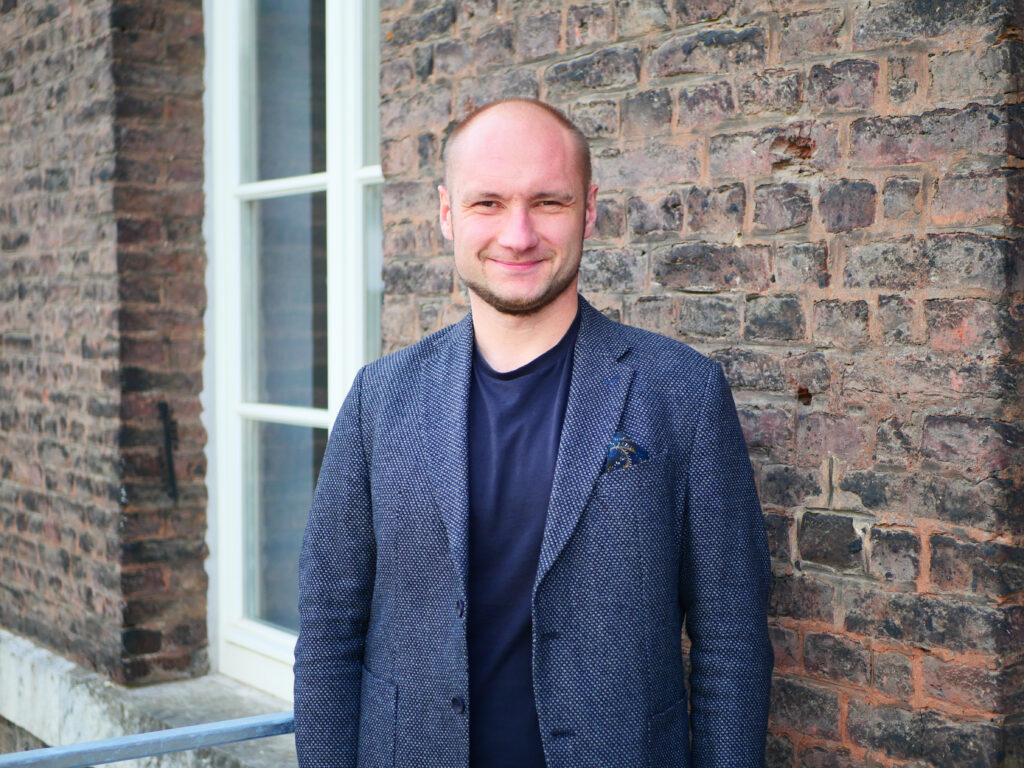
Dawid Kasprowicz is a research assistant at c:o/re where he coordinates the fellow program. From 2005 to 2012 he studied media studies and philosophy at the Ruhr-University in Bochum and at the Université du Littoral Côte d’Opale in Dunkerque. He graduated with a master thesis on Bernard Stieglers concept of psychopower. From 2013 to 2016 he was a PhD student at the Institute for Advanced Studies on Media Cultures of Computer Simulation in Lüneburg. In his dissertation, which was published in 2019 (Nomos), he developed a history of knowledge about the concept of immersion. From 2018 till 2021, he has been a postdoc at the chair for Theory of Science and Technology at the RWTH Aachen University where he was also the Head of the Computer Science Studies Lab (CSS-Lab). In autumn 2021 he was a DAAD-Visiting Scholar in the Department of Philosophy at the University Rouen (Natalie Depraz).
In his habilitation he develops a phenomenological approach to the philosophy of computational sciences based on the concept of experience and a theoretical intersection of phenomenology of technology and philosophy of science. His main research fields include theory and history of embodiment, phenomenology, human-robot-Interaction, philosophy of computer simulation.
Selected publications
Kasprowicz, D. (2024). Virtual Worlds, Models, and Experience: A Primer on Enactivism and Philosophy of Science. Cybernetics and Human Knowing, 31(3-4), pp. 13-34.
Hocquet, A., Wieber, F., Gramelsberger, G., Hinsen, K., Diesmann, M., Pasquini Santos, F., Landström, C., Peters, B., Kasprowicz, D., Borrelli, A., Roth, P., Lee, C. A. L., Olteanu, A., & Böschen, S. (2024). Software in science is ubiquitous yet overlooked. Nature Computational Science.
Gramelsberger, G., Wenz, D., & Kasprowicz, D. (2024). Understanding and Analysing Science’s Algorithmic Regimes: A Primer in Computational Science Code Studies. In J. Jarke, B. Prietl, S. Egbert, Y. Boeva, H. Heuer, & M. Arnold (Eds.), Algorithmic Regimes: Methods, Interactions, and Politics (pp. 57–78). Amsterdam University Press.
Becker, M., Kasprowicz, D., Kurkina, T., Davari, M. D., Gipperich, M., Gramelsberger, G., Bergs, T., Schwaneberg, U., & Trauth, D. (2024). Toward Antifragile Manufacturing: Concepts from Nature and Complex Human-Made Systems to Gain from Stressors and Volatility. In P. Letmathe, C. Roll, A. Balleer, S. Böschen, W. Breuer, A. Förster, G. Gramelsberger, K. Greiff, R. Häußling, M. Lemme, M. Leuchner, M. Paegert, F. T. Piller, E. Seefried, & T. Wahlbrink (Eds.), Transformation Towards Sustainability (pp. 425–448). Springer International Publishing.
Kasprowicz, D., & Rieger, S. (2023). Virtualität. In N. Kersting, J. Radtke, & S. Baringhorst (Eds.), Handbuch Digitalisierung und politische Beteiligung (pp. 1–18). Springer Fachmedien Wiesbaden.
Kasprowicz, D. (2022). Ästhetik als Unschärfe – Günther Anders und die Frage nach dem Film als Kunst. In A. Friedrich, P. Gehring, C. Hubig, A. Kaminski, & A. Nordmann (Eds.), Kunst und Werk (pp. 125–144). Nomos Verlagsgesellschaft mbH & Co. KG.
Kasprowicz, D. (2022). Maintaining Relations and Re-Engineering the Social: A Reply to Becker’s “The Three Problems of Robotics and AI.” Social Epistemology Review and Reply Collective 11(8), 50–56.
Kasprowicz, D. (2021). Achtung! Hunde auf der Fahrbahn: Reinforcement Learning und die Modellierung autonomer Agenten. In F. Sprenger (Ed.), Autonome Autos (pp. 187–210). transcript Verlag.
Kasprowicz, D. (2021). New Labor, Old Questions: Practices of Collaboration with Robots. In E. Schüttpelz, U. Bergermann, M. Dommann, J. Stolow, & N. Taha (Eds.), Connect and divide: The practice turn in media studies (1st edition, pp. 247–261). Diaphanes.
Kasprowicz, D., & Rieger, S. (2020). Handbuch Virtualität. Wiesbaden: Springer.
Kasprowicz, D. (2019). Der Körper auf Tauchstation. Zu einer Wissensgeschichte der Immersion. (Reihe Wissenschafts- und Technikforschung, 19). Baden Baden: Nomos.

